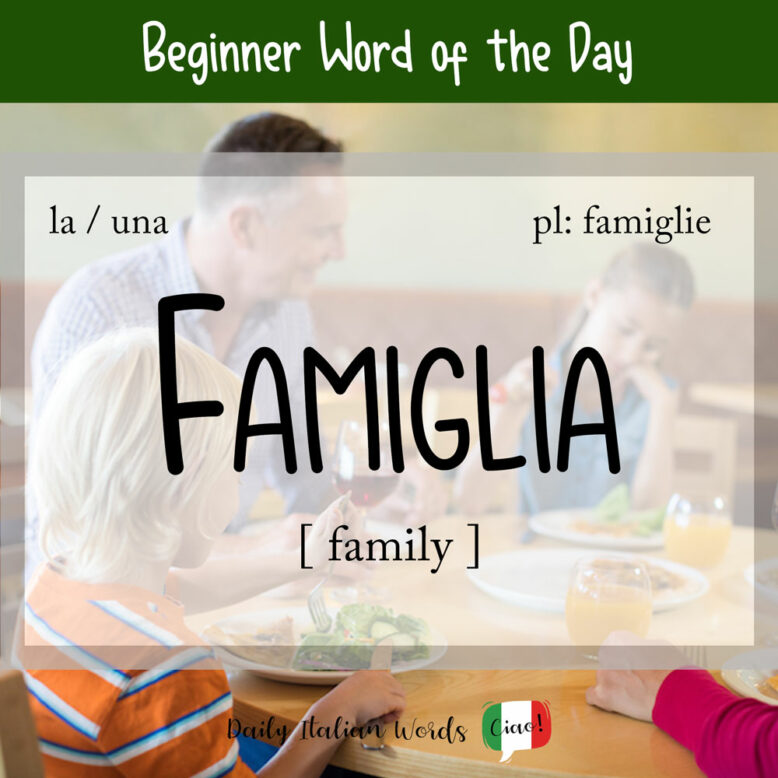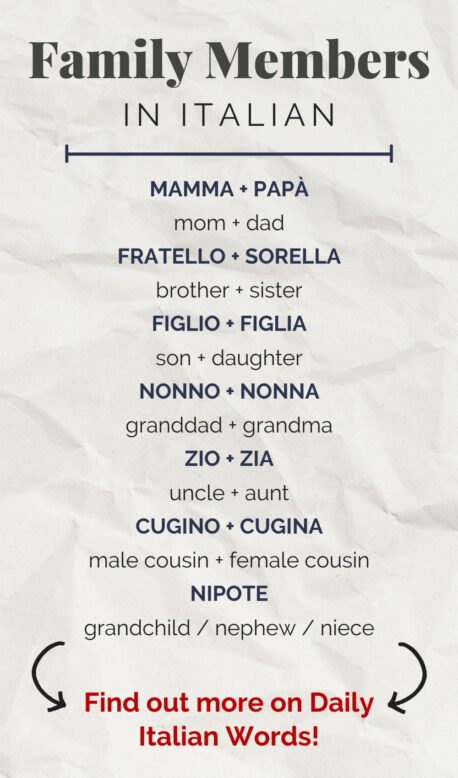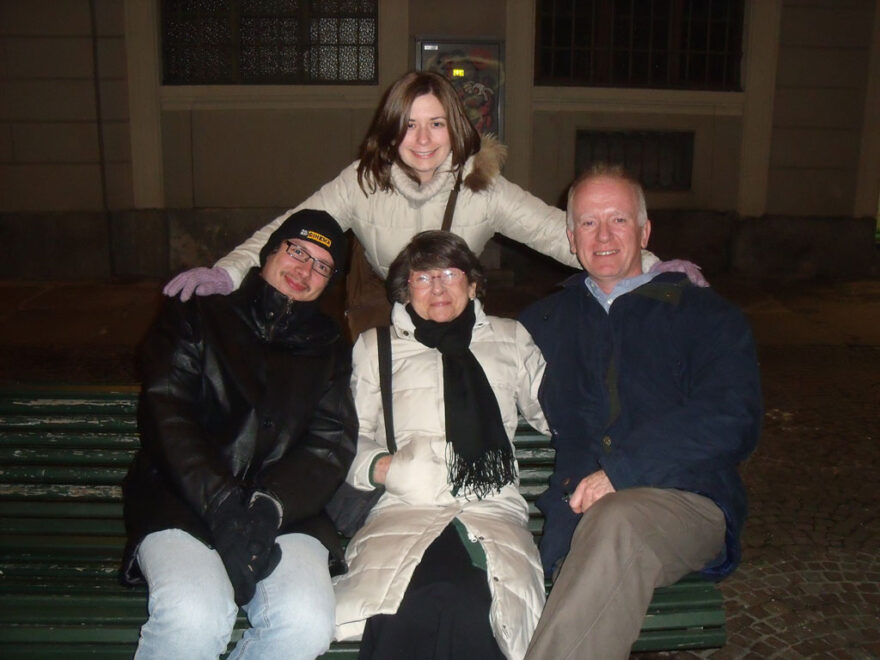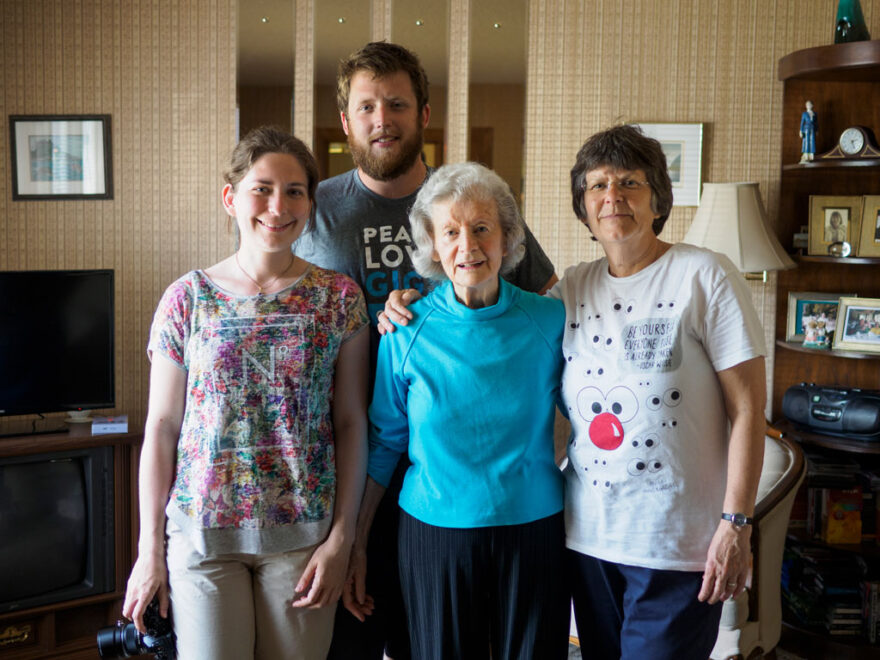Like many other nations, the family plays a central role in Italian culture. The further south you go, the more sacred the concept of family becomes. Famiglia is the translation of family in Italian.

It is a feminine noun that takes the following definite and indefinite articles:
la famiglia
una famiglia
le famiglie
delle famiglie
The most important members of any family include:

In addition to referring to a group of blood relations, you can use famiglia to refer to a dear group of friends, colleagues, or someone who is well-acquainted with your family.
Ogni estate passiamo due settimane al mare con la famiglia di lei.
Every summer we spend two weeks at the sea with her family.
Conosciamo Paolo da anni. Ormai è di famiglia.
We’ve known Paolo for years. He is like family to us.
Io e i miei colleghi lavoriamo insieme da dieci anni. Siamo una grande famiglia.
My colleagues and I have been working together for ten years. We are a big family.

Famiglia can be used to refer to a mafia clan or mafia family, as well as to classify things that have common characteristics:
- famiglia di vocaboli = family of words
- famiglia di vettori (matematica) = family of vectors (mathematics)
- famiglia di mammiferi carnivori = family of carnivorous mammals
Famiglia can be used in idioms to say that a family is forming, meaning that two people are getting married or having a baby:
- La famiglia si allarga = the family is getting bigger (a baby is coming)
- Mettere su famiglia = to get married, to start a family
Ho 35 anni. È ora di cercare una moglie, comprare casa e mettere su famiglia.
I’m 35 years old. It’s time to find a wife, buy a house and start a family.
You can use the noun famiglia to signify that you’re doing things with other members of the family:
- Fare le cose in famiglia = to do things together
- I panni sporchi si lavano in famiglia = family matters should be kept within the family (don’t wash your dirty linen in public)
- avere una famiglia alle spalle = to have a family that supports you (spalle means shoulders)
If you come from a modest family, you can say famiglia modesta or famigliola, but the latter has a more derogatory meaning. On the contrary, to say essere di buona famiglia (to be of a good family) or venire da una buona famiglia (to come from a good family) means to come from a wealthy family.

Verbs and other words
The noun famiglia can be combined with other words to describe different types of families, as well as other things:
- famiglia reale = royal family
- casa famiglia = group home
- capo famiglia = head of the household
- famiglia di fatto (also coppia di fatto) = partnership (fatto means fact, coppia means couple)
- famiglia patriarcale = patriarchal family
- stato di famiglia = family status
- certificato di famiglia = family certificate
Famiglia can become the adjective famigliare, although the spelling familiare is more common. It means familiar, but can also be used to describe things meant for family use.
Sto cercando un’automobile familiare.
I’m looking for a family car.
As a noun, familiare becomes another name for a relative.
The verb familiarizzare can be used to describe the action of familiarising oneself with something, or two people getting to know each other.
Ho cominciato a familiarizzare con il nuovo vicino di casa. Mi sembra un tipo simpatico.
I’ve started to get acquainted with the new neighbour. He seems like a nice guy.
Finally, we have the word familiarità which means familiarity. It refers to someone who has confidence with or good knowledge about someone or something.
Mia mamma ha una buona familiarità con il computer adesso.
My mum has a good familiarity with the computer now.
Mathieu Gasquet was born and raised in Turin in the north of Italy to an Italian mother and a French father. He provides the audio pronunciation for Daily Italian Words.


